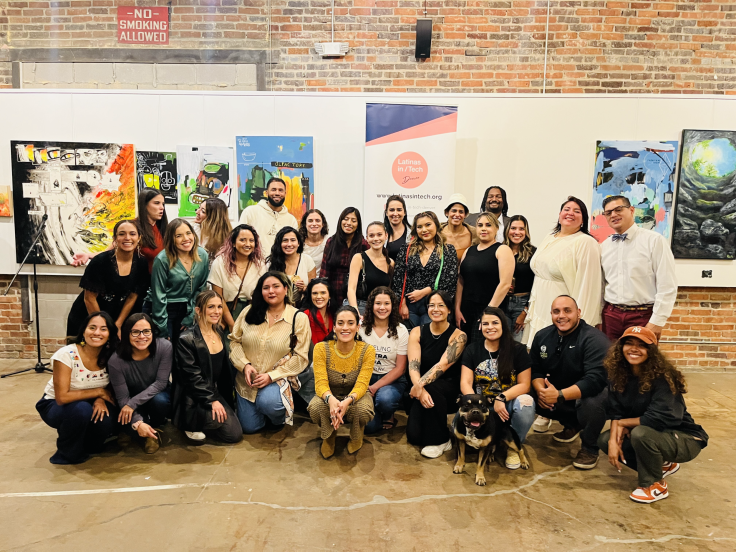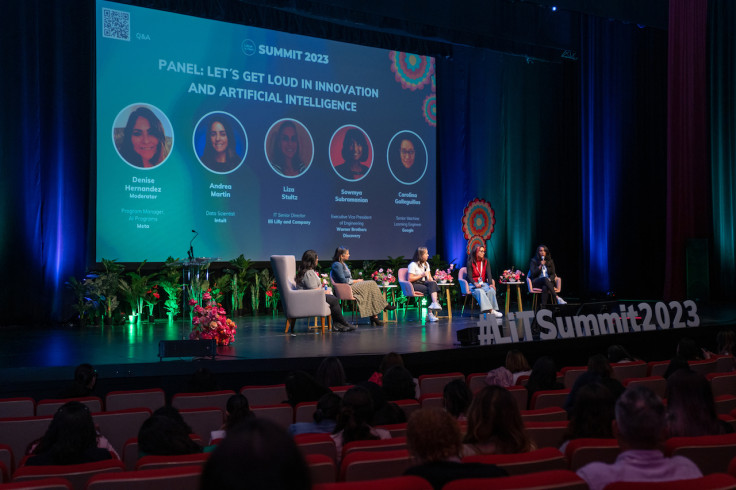
Curiosity has always been key in the career of Aimara Rodriguez, a first generation Honduran-American business strategist based in Colorado, and led her to co-found the Denver Chapter of Latinas in Tech.
"Can you translate this for me? Do you know how this works?" her parents, housekeepers and landscapers struggling to make it in the U.S., would ask her, the youngest of four siblings, when growing up in Alabama.
"i always found myself learning about new things while I was young. So as I started to get older, the dots kind of clicked for me," she told The Latin Times in an interview a few days before of Latinas in Tech annual summit.
The event, which kicked off on May 16 in San Francisco, California, aims to empower Latinas as innovators and leaders and help to shape the tech industry so women of color are well-represented at all levels.
Aimara, one of the speakers at the summit, has been working for ten years in the intersection of startups, tech, and products. Her area of expertise is operations management, partnership development, and product strategy.
She currently works in her own company Function f(x) Wellness. Focused on people of color and at-risk youth, the company provides traditionally overlooked communities the opportunity to take part in the benefits that different disciplines of training and movement bring to "the mind, body, and soul."

"I was raised in Birmingham, Alabama, which can be very conservative, but at the same time gave me just a really good sense of how to find the type of person that I am, especially when I didn't see a lot of people like me and my parents," she says.
"The fact that I'm Latina, first generation, and had opportunities but also challenges to explore things professionally that my other siblings haven't had the opportunity to – that's taught me a lot about myself and my identity. And it's why I always wanted to somehow give back to black and brown communities."
Aimara has worked with Latinas in Tech for almost a decade, first in the New York Team, and then in Colorado, where she has met some of her closest friends. "Even though the lens of our chapter is professional development, personal development is just as important. As you continue in your professional trajectory, the system isn't set up for people like us, and therefore it can be disheartening and really challenging."
The following conversation has been edited for length and clarity purposes:
-How did you navigate through these challenges?
As much as I am very grateful for all the things I've been able to accomplish professionally in technology, it has come at a great personal cost. When I was 23, I burnt out, textbook-definition. I landed in the hospital, I was a shell of myself, and it took me a few years to kind of get back to the Aimara that was me.
That's why today I am building Function f(x) Wellness alongside my brother and closest friend, Carlos Rodriguez, a co-founder, and Emma Dominguez-Millan, who is the Head of Programming of our company.
-What do you try to accomplish with Function f(x) Wellness?
This is our first step at building that generational equity and wealth that has never existed in our family. It's been fulfilling. We focus on four key demographics being at risk: youth, older adults, individuals with physical and or mental disabilities, and BIPOC communities (Black, Indigenous, and People of Color.) We give them access to programs, events and curriculum that allow them to not just move their body, but to also understand things like risk assessment and access to opportunity and how to get comfortable around themselves and other people. Regulating emotion, communicating emotion. All of these things that traditionally we're not really exemplified growing up.

-So technology has been not only your way to make a living, but has also given you the opportunity of making something amazing for your community, while at some point it burned you out. Why do you specifically encourage Latinas to go into technology?
I encourage people of color to explore new opportunities because it allows you to build a level of self-confidence that maybe you haven't had, because you've always had to do so much in your family and in your communities. And because it allows you to reap benefits and rewards that some people have been benefiting from their whole lives. Having the opportunity to work in technology and leadership positions for ten years, I've had the opportunity to make money that otherwise I wouldn't have and make money that my parents never certainly had the opportunity to make.
Money isn't the most important thing, but people do need to understand that the access to money, to opportunity, and to a network, that's a level of social currency that Latinos typically do not have. And because of that, we suffer. And because of that, it becomes a barrier for us to get ahead to where we want to go and to build generational wealth and to build generational equity.
-Denver, where you are based now, is experiencing a huge transformation. While Latinos comprise the second largest racial or ethnic group in Colorado at 22% of the population, the state has become a hot spot for San Francisco Bay Area tech companies to open secondary offices. Is this a special window of opportunity for Latinas?
Before moving to Colorado, I lived in New York for ten years. It is a great city, but in a way it's a little bit oversaturated. If you're a business owner or a professional of color trying to find your way, it's really hard to get into those rooms. And what I really love about Colorado and Denver specifically, is that it offers you the perfect mix of professional growth and innovation. But you also have a variety of other types of professional opportunities, such as non-profits.
It doesn't matter whether you work in tech or you are an entrepreneur or you're a stay at home mother, or you have a job in a very traditional field. Through our chapter here in Denver, we're trying to bridge the gap. We host a variety of events that focus on different aspects of professional development, interview prep, resume writing, among others.

Are there any specific barriers in the Tech field for Latinas, such as glass ceilings or others?
Denver is primarily white, and specifically for professional development for Black and brown individuals, it can be difficult to fight for a management position or role over someone else who may have a personal connection. I don't want to overgeneralize and say that we don't have our own level of opportunity and privilege.
But at the same time, if you don't have a connection to someone at that company and have never had the opportunity to learn what a good resume looks like, how to effectively pitch yourself, or what you should and shouldn't mention in an interview, you're likely learning as you go in real time. This can bring on a whole set of challenges.
Lastly, how do you anticipate the outcome of the 2024 elections impacting the future of Latinas in Tech in the U.S.?
I think here in Colorado, you can definitely sense some possible friction. And it comes with biases related to the migrant situation that's unfolding across the country. It comes with people making assumptions and not educating themselves on just how impactful the Latino community has been in the U.S..
Through Latinas in Tech, we do the best that we can to help dismantle this narrative that Latino migrants are the problem. Because I think it's very easy for Americans or, let's say primarily white people, to just make that assumption. Thankfully, Colorado is a little bit more progressive in terms of their stance against the candidates this year, but it can negatively impact us and how people treat us.
In the workplace is really just making sure that people understand they are not hiring us because we're Latinas or people of color. We are just as capable as the next person. The only difference is we traditionally haven't been given the opportunities to exemplify that.
We've earned our privilege, whereas other people are just born with it. And I think that is the key differentiator that sometimes people don't understand. You walk around with your privilege that you've had since the day that you were born, and we've had to fight as hard as we can to earn privilege that's not even the same level that you have. And at the end of the day, we're people. We're humans. We shouldn't be diluted down to a certain type of group.
© 2024 Latin Times. All rights reserved. Do not reproduce without permission.







